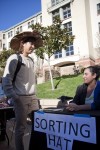In July of 2011, many fans of author JK Rowling’s beloved and acclaimed “Harry Potter” series entered into what has been dubbed “post-Potter depression.”
With the release of the final installment of films based on the wildly popular book series, it seemed as if Harry Potter’s story had come to an end and readers would be left with only their memories and experiences of the movies and novels.
However, “Harry Potter” has proven to be a literary and cultural phenomenon with staying power that has even come to transcend generations. Nearly every age group has become part of the “Harry Potter” culture, including many of today’s college students who grew up reading the books and watching the movies as they were released.
Sarah Mesle, a visiting assistant professor in the department of English who taught a class in the fall on young adult literature, said “Harry Potter” has gone over a tipping point and become something that nearly everyone has read, making it relatable to just about anyone within a classroom setting.
“I reinforce the importance of (‘Harry Potter’) because it is a common text in a time when our culture seems fragmented,” Mesle said. “‘Harry Potter’ provides a type of shared experience.”
Chevalier’s Books, located on North Larchmont Boulevard, reported that “Harry Potter” sales are not as high as they once were, but customers still come in to purchase individual books from the series.
While the younger fans have grown into the world of “Harry Potter,” many older fans were there when the series was first released in the U.S. in 1998.
College campuses are not immune to this “Harry Potter” mania. UCLA’s On-Campus Housing Council dedicated the first week of this quarter to all things “Harry Potter,” symbolizing both the enduring popularity of the series as well as the development of an actual “Harry Potter” culture of sorts.
The students who participated in this week’s events represent a wide range of academic interests and backgrounds, but all of them have one thing in common: their love for a certain wizard and his magical story.
Many of these students, such as first-year human biology and society student Mallika Singh, chose to volunteer at various “Harry Potter” events because of a love for the series and what it has come to symbolize in their personal lives.
“We are the ‘Harry Potter’ generation,” Singh said. “‘Harry Potter’ is synonymous with our childhood, and I associate it with good memories.”
Even with this group of avid Potter fans on campus, other Bruins are more removed from the “Harry Potter” culture. Students like sixth-year atmospheric, oceanic and environmental sciences student Taleior Boykins have not read any or all of the books. Some were not interested in reading such a long novel at the time, and others simply did not care for the story.
“I got a (‘Harry Potter’) book for Christmas when I was 10, but I wasn’t a very avid reader at the time,” Boykins said. “I like reading fantasy and fiction, but I never really got into it.”
First-year biology student Shant Ogtanyan said that he has seen some of the movies but never read the books because he thought they were too long.
On the other hand, first-year undeclared student Tori Owens said she went through “post-Potter depression” after the books and movies came to an end and tried out “Harry Potter”-themed groups including the Quidditch team upon her arrival at UCLA this fall.
“‘Harry Potter’ gave us seven books and eight movies, but it also gave us a magical world that was so similar to ours that it seemed real,” Owens said.
It is precisely this experience that has drawn readers and fans such as first-year neuroscience student Sepideh Parhami to the “Harry Potter” books, as opposed to other series like “The Hunger Games.”
“I read ‘The Hunger Games’ series, but it was no replacement,” Parhami said. “‘Harry Potter’ is still a big part of my life, and my friends and I constantly use ‘Harry Potter’ jargon.”
Mesle also said other popular books such as those in the “Twilight” and “The Hunger Games” series appeal to an older audience, whereas people from all age groups have read “Harry Potter.” In her opinion, “Harry Potter” is still relevant in today’s evolving literary culture.
“I am not sure what the next big thing is because I think ‘Harry Potter’ is still the thing,” Mesle said. “It created a community.”
Email Seikaly at aseikaly@media.ucla.edu
